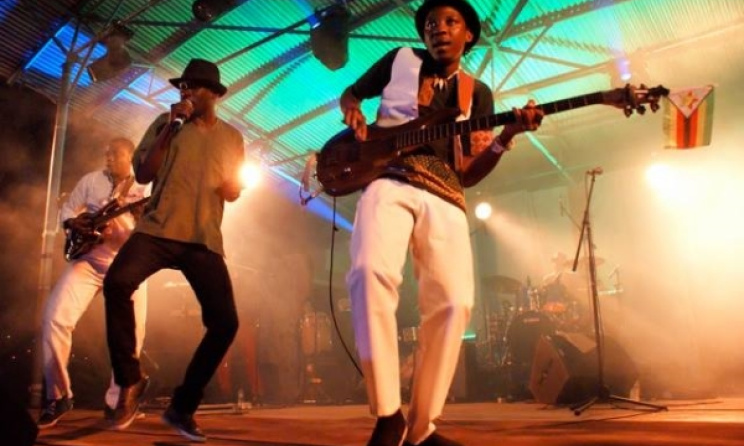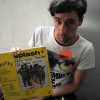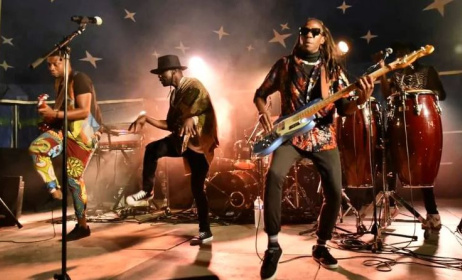Mokoomba: On The Rise
One of the hottest young acts on the African continent these days is a six-piece band named Mokoomba, hailing from the Zimbabwean border town of Victoria Falls. Their signature brand of high-energy Afro-fusion, which draws on their Tonga background and adds a healthy dose of funk, Latin and other African influences, has won them fans all over the world, thanks to a rigourous touring schedule and an explosive live show. The band is made up of Mathias Muzaza (lead vocals), Trustworth Samende (guitars), Donald Moyo (keyboards), Miti Mugande (percussion), Ndaba Coster Moyo (drums) and bass player Abundance Mutori. Abundance and the band’s manager Marcus Gora found time to chat with Music In Africa recently about where they come from and the journey that lies ahead….
 Mokoomba at Bushfire in 2014. Photo by David Durbach
Mokoomba at Bushfire in 2014. Photo by David Durbach
MIA: Tell us a bit about where you guys come from…
AM: We come from Victoria Falls in Zimbabwe, all six of us. We stay in the same neighbourhood in Victoria Falls, Chinotimba. That’s where we grew up and how we met, going to the same schools, playing together from a very tender age. We knew this old guy called Alfred Mjimba, who has passed away now. We were still young and couldn’t afford our own instruments. He was a performing artist who had musical equipment and wanted to play with young artists. We used to go after school and play at his house. He gave us an opportunity to really mess around with musical instruments. We were always teaching ourselves. At school we didn’t have really professional teachers - it was like a general music class. My father was playing at church - he’s the guy who first taught me to play bass. He wasn’t really good but he taught me some chords and the basics. And from there it was down to myself, and meeting other musicians. And these days we’ve got the internet - you can watch tutorials by yourself, and research what you like.
So we’ve been playing together for quite a long time, over 10 years. But professionally we really only started to make the band in 2007, when we finished school. We met up with a project called Music Crossroads, which does youth empowerment through music. We thought it could be a great opportunity for us, coming from a smaller town. We entered the competition and that’s where we had a stepping stone to getting into the professional scene - going to Harare for the first time and performing against bands from other provinces in Zimbabwe and taking first prize to represent Zimbabwe against bands who had won in other countries. The final was in Malawi in 2008 and we won first prize, which was to have a two-month tour and record an album. So that’s when we had a chance to record our first album, called Kweseka, which means ‘drifting ahead’. That was our first album, a six-track album, in 2009. Then we went on our first European tour.
MG: You always need to have something on tour to sell after a gig, so it didn’t really get a proper release. The second album we did, Rising Tide, is the main album we have. We re-recorded one track, but the others were completely new material that the guys were working on. Rising Tide was a reflection of the growth from the time they were just jamming to now getting into serious music. We actually had to move from Victoria Falls to Harare, because that’s where things happen. We were playing regularly and the material from that was what made Rising Tide.
How does Mokoomba write its songs?
AM: Basically Mathias, our lead vocalist, comes up with most of the lyrics, but we usually come up with ideas together. All ideas are really welcome. Sometimes you can just kind of come up with an idea in soundcheck or rehearsals, and everyone can start to add his own ideas. So we really make it up together, everybody brings his own ideas and how he feels, then we just try to find a way how best we can put it together. With lyrics, Matthias is the man most of the time, but we can also help each other. If we have a groove first and the song is coming but we don’t have anything to sing about, we can just discuss it together. The guys can see how best to come up with a good title of the song, or what we can sing about.
What are some of the band’s influences?
AM: There are specific people that we’ve looked up to since we were young, people like Salif Keita, Youssou N’Dour, Baaba Maal and Oliver Mtukudzi from our own country. These are some of the icons who’ve made it in the music industry. We had the opportunity to live in Victoria Falls, which is like a border town to other southern African countries. It’s near to Zambia, Angola, Namibia and Botswana. There’s a lot of musical styles happening there that we love, other languages and cultures.
MG: Also just listening to their parents’ collections. There was kind of a golden age of parents having music, maybe on vinyl or on cassette. We listened to a lot of these things from our parents’ collections and it sort of comes through. Because you’re young, you kind of take everything in. And because local radio is playing American and British stuff, you cannot ignore that, so it all filters though… It’s very organic, but credit to Victoria Falls as an area where you have a border with Zambia, with Botswana and with Namibia. All those cultures are together there.
Do you feel that you are representing Tonga culture?
AM: Yeah, of course. It’s a different style of music that we have. We are still trying to put this out so that people know about our Tonga culture and traditions, the types of singing and the traditional ways of playing the drums. So fusing that with other modern genres of music, it makes it bigger. The audience we can aim at is bigger than if we were just playing traditional Tonga rhythms, so we thought of making up a fusion, fusing our own traditional Tonga culture with other modern types.
MIA: How do you balance the demands of local versus international audiences?
MG: What we’ve done is keep pretty much the same act, and we go with that everywhere. We first kind of showcase it in Harare and Bulawayo and see the response. We haven’t split to say this will cater to local tastes and this will cater to the international. It’s just the one act. And we’ve been lucky, even though on the home front the uptake has been a bit slow. People want to see what’s going on, because it’s not part of the usual genres that people are used to, like Sungura or Dancehall. So if it’s not either of the two, you kind of have to work your way into it. But it’s been great, now we have a solid following in Zimbabwe for the same music that we take around the world. Radio play is a bit slow, but we do get a bit. We wish it was a little more, but now it’s beginning to happen, because we’ve won a series of awards and it has drummed up quite an interest amongst the people.
AM: When you go to Europe or the UK, people in Zim say ‘wow!’, because they see some programmes on TV and they want to know more. It can add up to us getting better known at home, by being well-known outside. People then want to know why we’re known outside our home country. The other thing is that we started touring mainly in Europe and people there started to like the music before we came back home. Now people at home are starting to want to know more. The audience is growing.
How does it feel to be where you are today?
AM: It’s a good feeling, man... You wanted to be a musician but you never really imagined that you could have this chance. So we’re really grateful for having these chances, because not a lot of young people get a chance. Even if you’re young and you dream of having these things, it can be hard. But for us it’s always a work in progress. We will continue to work hard because this is what we love to do and have the opportunity of doing, so we do our best. We are learning all the time, and meeting new people, talking to them and finding out how they are doing it. So it’s really great… Of course we miss home, but if we have free time after coming back from tour, we always go back and see our families and spend the little bit of time that we have with them. And they’re also happy. They’ve been with us since we were studying and are always following our progress. We are also inspiring other young people in Zimbabwe who want to get into music. When they hear we’re back home, they always want to come and have a chat with you, so that you can tell them what you’ve been seeing and your experiences in music.
It’s not every day one sees a guitarist put down his guitar on stage to dance. Do you guys put in a lot of effort into planning your live show?
AM: Yeah, for sure. We saw that we are multi-talented musicians - we can play, we can sing, we can dance. So we decided to use all of those elements in our music. We thought it would be great to see a guitarist playing and also having the opportunity to dance. People like to see that. We take time to rehearse it, song by song, so we know for each song we have this choreography, and we really practice that. These are also some of the elements that we’ve learnt through the Music Crossroads competition, the workshops they do with the artists. They tell you about stage attitude, stage presentation, stage work and everything. This is one of the things we’ve learnt that we’ve tried to incorporate into our music
Where do you see yourselves in five years’ time?
AM: We want to be working, working, working, making good progress and getting good reviews. We see ourselves becoming big artists who can also inspire other artists. Because we’re meeting big artists and we’re doing our level best all the time. If we are performing, we really give all the energy that we can give. So all things are good - we are excited about the future, because we are doing what we love to do, and we’re still young.
MG: For us it’s just this excitement to be where we are right now. There’s a lot of potential to become one of the most interesting bands to come out of Zimbabwe, or Africa as a whole. We are trying by all means not to be cautious, but to learn and not fall. There are so many pitfalls that young bands fall into. How to navigate the terrain and not make the same mistakes, and get the best out of the opportunities that there are - that’s where we are right now. There’s a lot of interaction that we’re trying to do, especially here in Africa. We’re hungry to connect. We’ve played at the Rift Valley Festival in Kenya, and also at Sauti sa Busara in Zanzibar. It’s an amazing experience to be up there in Africa. We’ve also been to Morocco, Zambia, Mozambique, Tanzania and Malawi for Lake of Stars and the Blantyre Arts Festival. So we’ve been moving around, but we need to do more. I think there’s plenty of opportunities to collaborate, and we are open to be on that path. And then, who knows, in 5 or 10 years, we could be a very decent band. Success is relative but all that comes with a lot of hard work, and we’re prepared to do that…



































Comments
Log in or register to post comments